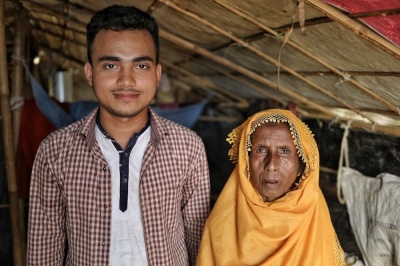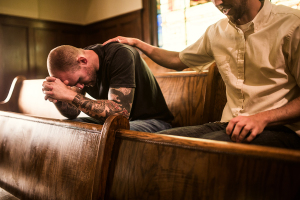On World Refugee Day: In their own words

How many of us have had the opportunity to listen to a refugee’s story, in his or her own words? Nearly 60 million people around the world right now have been forced from their homes; a third of them have been forced from their countries and are unlikely to ever be able to return home. Immediate images of blue tarps and makeshift shelters, runny noses and struggling mothers come to mind. But our world’s refugees are more than images and statistics.
Mark 6:34 When he went ashore he saw a great crowd, and he had compassion on them, because they were like sheep without a shepherd. And he began to teach them many things.
If you were to hear their stories, what might you learn?
Here is just one. It’s an unexpected story of healing and friendship between a vibrant 21-year-old young man and a timeworn and frail 60-year-old woman. Both barely escaped murderous assaults on their villages in 2017. Their story doesn’t have a Hollywood ending by any means. But it is a reflection of our shared human spirit of caring community.
Jabair and Asima are Rohingya, an ethic minority in Myanmar (formerly Burma); a people without a country who face what a UN human-rights chief described as a "textbook example of ethnic cleansing." Today, more Rohingya live as refugees than those that remain in Myanmar, bringing the total to 1.2 million. Most live in and around a massive maze of a refugee camp in Bangladesh called Kutupalong, the largest refugee camp in the world.
Back in Myanmar, Jabair had completed secondary school in 2014 and wanted to go onto college, but “I couldn't continue my graduation because the Rakhine State [in Myannmar where the Royhingya live] doesn't allow the Rohingya to attend colleges and universities. I had nothing to do after that, so I started reading some books on my own and I started helping my father in his business.” His father sold motorbike parts, but Jabair says, “I often thought about completing my education.”
Jabair has four brothers and a sister. “One day we heard about military violence next to our village. We were so scared after hearing that. We were pretty much sure that something was going to happen like it did in 2012. In 2012, the Myanmar military killed thousands of lives. They burnt so many houses. I still remember they were throwing little babies into the burning houses. How can someone be this kind of beast? Humans can never do this!”
But soon, his village’s fears became reality. “The military started throwing rockets with rocket launchers from the neighboring village. So many houses got burned. So many lives were taken during that time. They cut off so many people's heads.”
The family quickly hid to save their lives.
“When we reached the river behind our village we came to learn that our village was fully burned. That news made us cry. We had nothing to do except leave.” They moved on to the next village where they stayed for a couple of days. “Still we were hearing news about murder from other people. We thought, this village is no longer safe now. Anything could happen.”
They met people who knew the way to Bangladesh. “So we started following them. We couldn't take the normal road to Bangladesh because the military buried bombs and landmines. So we had to take another route, which was hilly and kind of a forest. We took some rice, bread, fried fishes and clothes with us. It took almost seven days to reach Bangladesh. It was November 2017 when we arrived here.”
It was then that the enormity of the situation hit him hard.
“When we arrived at the Bangladesh border, I saw a lot of boys around my age who were distributing food to us. Finally, I realized that I had lost everything in my life. I had nothing left. I felt so dizzy; I sat on the road like a statue.”
Alongside 740,000 others, Jabair and his family had to find a way to settle into the massive refugee camp. It was a very difficult adjustment for everyone, but Jabair took it particularly hard.
“One day I met with one of the Bangladeshi guys from an organization who was asking me if I'm interested in doing some translation work for them. I said yes.” Finally, Jabair had somewhere to put his schooling into practice.
1 Peter 4:10 As each has received a gift, use it to serve one another, as good stewards of God’s varied grace…
“It was October when Medical Teams International (MTI) started their Community Health Worker (CHW) program. Our field coordinator found a place to make our first primary health center. Then, we started the journey of serving primary healthcare to the Rohingya patients.”
Asima was one of them. Considering the life she’s had to lead, it is no wonder she is frail at age 60. “It's been hard for us to live without a man in the family,” she says. Her older son is in prison in Myanmar. Her husband and her daughter's husband were killed by the Myanmar military. Then in 2017, “the military started killing people in my village. They started burning houses. They were telling us to leave the village. We had no other way except leave our home. We had to leave it.”
Neighboring villages were under dangerous assault. “We had to hide from the military because they were firing all day long. We left the village with our neighbors. We crossed the Myanmar border with boats and arrived in Bangladesh. It took only two days to reach here. We couldn't take anything from our house while leaving Myanmar. The money that we took with us was spent for the boat ride. Nothing left with us.”
Asima, one of her daughters, and four children, temporarily stayed with another daughter already in Bangladesh. They received money from her to buy bamboo, food, and some other necessities “for our shelter; then, we moved to Kutupalong [refugee] camp and built our own shelter. We are living in this camp now.”
Asima was very weak from the beginning. Her shelter was near MTI’s primary health center. The doctors there eventually diagnosed a serious form of pneumonia for which they had to send her to the Doctors Without Borders medical clinic for appropriate care. Jabair went with her to hand over her case. When the doctors told Asima that she’d need to stay for at least three days in the clinic, she became very upset. She was alone and frightened, with no one to stay with her.
Jabair stayed. He stayed by her side and remained at the clinic every night until 9 PM, for three consecutive nights. When Asima was feeling better, Jabair escorted her back to her shelter. He did this for a stranger, for a widow, for a refugee. For Asima.
Galatians 6:2 Bear one another’s burdens, and so fulfill the law of Christ.
Here’s what Asima has to say, “I'm so lucky that I found someone like Jabair who took care of me. He's more than a son. I will always be grateful to him. Though life is becoming hard for me, I don't want to go back to Myanmar. At least now, there's no sound of gunshots.”
Jabair now works for FH and MTI as an interpreter. He says, “I feel good working with FH and MTI because they care about the Rohingya; they care about their feelings.” When Jabair isn’t translating, he stays in and around the Kutupalong camp, hopeful for clear paths forward.
“I still dream about completing my education,” he says. “Maybe someday it will happen.”
Special thanks to Nihab Rahman & Jen Meyerson, Food for the Hungry staff, who dedicate their work to making refugee lives better and gathered Jabair and Asima’s story.
Ed Hatch is the CEO of Food for the Hungry, a Christian international relief and development organization graduating communities from extreme poverty and currently serving the Rohingya refugees in Cox’s Bazar through health, water, and sanitation initiatives.



























